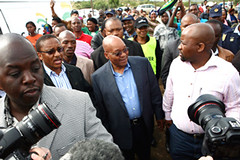
ANC President Jacob Zuma votes in his home area in the Republic of South Africa. He will be the new leader of Africa's largest economy.
Originally uploaded by Pan-African News Wire File Photos
15:25 Mecca time, 12:25 GMT
South Africans head to the polls
Zuma voted in his rural home village in KwaZulu-Natal to cheers from hundreds of supporters
South Africans are voting in general elections which are expected to propel Jacob Zuma, the leader of the ruling African National Congress (ANC), to the presidency.
Opposition parties are hoping to capitalise on voter frustration over corruption and crime, but Zuma has said he will tackle poverty in the country where almost half of the population lives on less than $2 a day.
Unemployment, energy, Aids, mining, land laws and immigration are among the other big issues in the election.
Polls opened at 7am (05:00GMT) on Wednesday at almost 20,000 voting stations nationwide, and are due to close at 7pm.
Kgalema Motlanthe, the South African president, said after voting in Johannesburg on Wednesday: "It was simple and straightforward.
"I think it's important for all registered voters to cast their vote, because at the end that is going to matter - everyone who participates in this election strengthens our democracy."
Nelson Mandela, South Africa's first black democratically elected president, ending white minority rule in 1994, also voted in Johannesburg.
David Monyae, a political analyst in Soweto, told Al Jazeera: "It appears we are entering a post-liberation era in the country. We all know the ANC is going to win, but the question is, 'when?' and 'with what percentage?'
"We are not sure if the Democratic Alliance is going to remain as the main opposition party. A lot of changes are taking place."
ANC support
Zuma, who voted in his home province of Kwazulu-Natal, said: "When I grew up, I did know that this day would come. This makes me feel great and it's a feeling far different from the one that we had under the apartheid government."
The ANC leader had corruption charges against him dropped two weeks ago, but the scandal has done little to dent the popularity of the ANC, still revered for leading the fight against apartheid.
Zuma has campaigned on promises to extend the gains of South Africa's democratic transition to millions of South Africans - a task made all the more challenging by the economy's slide towards recession.
More than 23 million people are eligible to vote for 400 parliamentarians. The new legislature will convene in two weeks to elect a head of state.
Opinion polls have tipped the ANC to win at least 60 per cent of the vote, with the new Congress of the People (Cope) and the Democratic Alliance (DA) expected to take about 10 per cent each.
Helen Zille, leader of the DA, said she was hopeful of a good result.
"I think South African voters know what we need to do to save democracy," she said at a polling station in Cape Town.
"I know that they know what to do to prevent a criminal state, and they'll go out today and do it."
Winnie Madikizela-Mandela, the former wife of Nelson Mandela and ANC Representative, cast her vote in Soweto on Wednesday morning.
"We are hoping, like all organisations that have had their problems, this time around, we are hoping that we are going to serve the people of South Africa as best we can," she told Al Jazeera.
Western Cape
Haru Mutasa, Al Jazeera's correspondent in Cape Town, said voting was going smoothly and that many people were voicing support for opposition parties.
"Independent polls and the people I have been speaking to here are saying that the ANC is not going to get a majority in the Western Cape.
"People are saying they have become disillusioned with the ANC, and that they have taken too long to deliver on their promises. Too many people still live in poverty, they want houses, water and education.
"It is likely the vote here will go to the Democratic Alliance."
Zuma had said on Tuesday that he would clean up government and improve public services.
"We are overwhelmed by the response of the masses of our people. We anticipate a massive turnout at the polls," he said.
"We reiterate that we will use our majority responsibly, and will not ride roughshod over the rights of the people, or bulldoze other parties into submission."
After nine years under Mbeki, Zuma has struck a chord among many South Africans for his embrace of traditional culture and his charisma.
The ANC won 70 per cent of the vote in the previous election held in 2004.
Voter turnout in South African elections has traditionally been high. Turnout in 2004 was 77 per cent.
South Africa's Independent Electoral Commission (IEC) says 23 million people are registered to vote and the elections will be monitored by almost 5,500 observers.
Source: Agencies
No comments:
Post a Comment